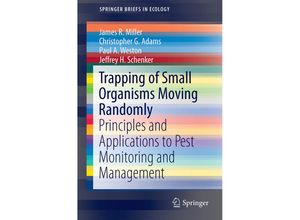This new book is the first to make logical and important connections between trapping and
foraging ecology. It develops and describes-both verbally and mathematically--the underlying
principles that determine and define trap-organism interactions. More important it goes on to
explain and illustrate how these principles and relationships can be used to estimate absolute
population densities in the landscape and to address an array of important problems relating to
the use of trapping for detection population estimation and suppression in both research and
applied contexts. The breakthrough nature of subject matter described has broad fundamental and
applied implications for research for addressing important real-world problems in agriculture
ecology public health and conservation biology. Monitoring traps baited with potent
attractants of animals like insects have long played a critical role in revealing what pests
are present and when they are active. However pest managers have been laboring without the
tools necessary for quick and inexpensive determination of absolute pest density which is the
cornerstone of pest management decisions. This book spans the gamut from highly theoretical and
fundamental research to very practical applications that will be widely useful across all of
agriculture.

